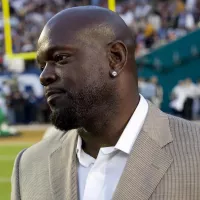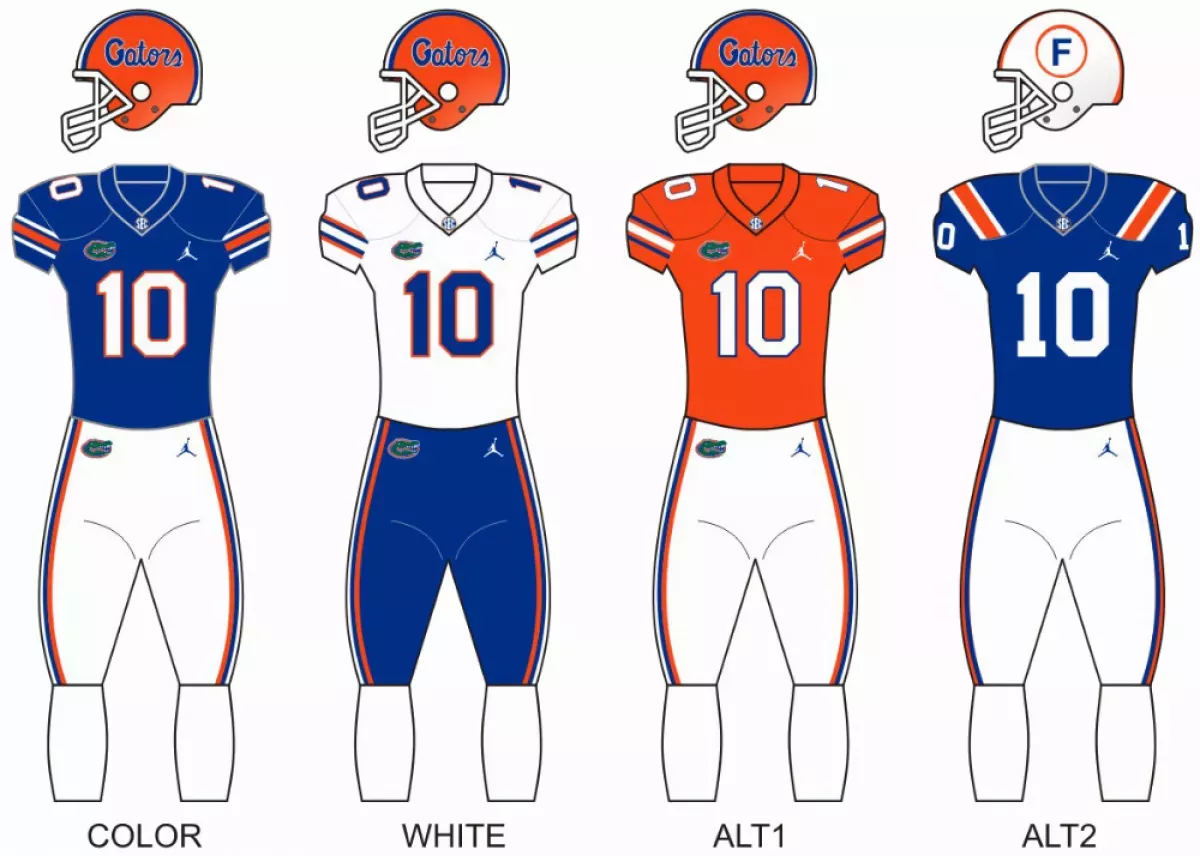The Florida Gators football program represents the University of Florida, competing in the NCAA's Football Bowl Subdivision (FBS) and the Southeastern Conference (SEC). Their home games are played at Steve Spurrier-Florida Field at Ben Hill Griffin Stadium in Gainesville, Florida. The Gators have a rich history including multiple national championships and Heisman Trophy winners.
1906: Football Program Established
In 1906, the Florida football program was established along with the University of Florida.
1906: University Established and First Football Team
In 1906, the University of Florida was established in Gainesville and fielded its first official varsity football team in the fall.
1906: First Home Games at The Ballpark
In 1906, the University of Florida's first football and baseball squads played their home games at The Ballpark, a primitive municipal facility near downtown Gainesville.
1911: Purchase and Move to University Athletic Field
In 1911, the school purchased the bleachers from the city and moved them to University Athletic Field.
1912: Joins Southern Intercollegiate Athletic Association
In 1912, Florida competed as an independent before joining the Southern Intercollegiate Athletic Association.
1915: Fleming Field Renaming
In 1915, larger bleachers were installed, and University Athletic Field was renamed Fleming Field.
1928: Nation's Top Scoring Squad
In 1928, the Florida Gators had an outstanding season, going 8-1 and leading the nation in scoring.
1930: Florida Field Constructed
In 1930, Florida Field, the newly constructed stadium, became the home of the Gators.
1932: Establishes Southeastern Conference (SEC)
In 1932, Florida joined with other schools to establish the Southeastern Conference (SEC).
1932: Founding of the SEC and Schedule Leeway
In 1932, after the SEC was founded, the conference allowed considerable leeway with regard to conference schedules for several decades.
1932: Joins Southeastern Conference
In 1932, the Florida Gators joined the Southeastern Conference (SEC) as a founding member.
1932: Southeastern Conference Founding
In 1932, the Southeastern Conference was founded by thirteen member institutions.
1933: Joins Southeastern Conference
In 1933, Florida's football program became a charter member of the Southeastern Conference (SEC), which began play that year.
1933: Southeastern Conference Play Begins
In 1933, the Southeastern Conference began play, and for several decades, each member was free to arrange its own conference schedule.
1945: Last Game Against Non-Collegiate Opponent
Since 1945, the Gators have not faced off against a non-collegiate opponent.
1947: Florida State Establishes Football Program
In 1947, Florida State (FSU) established a football program.
1958: Annual Game Against Florida State Begins
In 1958, Florida began playing in-state rival Florida State every year.
1958: First Game Against Florida State
In 1958, Florida first faced Florida State, beginning an annual series.
1966: Three Original Members Leave SEC
By 1966, three original members had left the Southeastern Conference.
1966: Steve Spurrier Wins Heisman Trophy
In 1966, Steve Spurrier, the quarterback for the Florida Gators, became the school's first Heisman Trophy winner.
1984: National Champion by Major Selectors
In 1984, Florida was named national champion by NCAA-designated "major selectors".
1984: First SEC Championship Vacated
In 1984, the Gators won their first SEC championship with a conference record of 5–0–1, but the title was vacated several months after the season by the SEC university presidents because of NCAA infractions.
1985: National Champion by Major Selectors
In 1985, Florida was named national champion by NCAA-designated "major selectors".
1985: Ineligible for the SEC Championship
In 1985, the Florida team finished atop the standings with a conference record of 5-1, but the team was ineligible for the championship due to its NCAA probation for rule violations.
1989: Stadium Renamed to Honor Ben Hill Griffin
In 1989, the stadium's name was extended to "Florida Field at Ben Hill Griffin Stadium" to honor UF benefactor Ben Hill Griffin.
1990: Spurrier Returns as Head Coach
In 1990, Steve Spurrier returned to his alma mater to become the Gators' head coach.
1990: Ineligible for the SEC Championship
In 1990, the Florida team finished atop the standings with a conference record of 6-1, but the team was ineligible for the championship due to its NCAA probation for rule violations.
1991: Consecutive Bowl Game Appearances Begin
In 1991, Florida began a streak of 22 consecutive bowl-game appearances.
1991: Southeastern Conference Championship
In 1991, the Florida Gators won a Southeastern Conference championship.
1991: First Official SEC Football Championship
In 1991, the Gators won their first official SEC football championship.
1992: Six Members Added to SEC
From 1992 onwards, six members were added to the Southeastern Conference.
1992: Standardized Schedules
In 1992, SEC schedules became standardized when the league split into two divisions.
1992: "The Swamp" Nickname Coined
In 1992, Steve Spurrier coined the stadium's nickname of "The Swamp" early in his tenure as head football coach.
1992: SEC Expansion and Standardized Schedules
In 1992, the SEC expanded to twelve teams, established two divisions, set an eight team conference schedule, plus a championship game between the two division winners, standardizing the schedules further.
1992: SEC Split into Divisions
In 1992, with the addition of Arkansas and South Carolina, the SEC split into eastern and western divisions, and a game between the division winners determined the SEC champion.
1992: Tied for SEC East Title
In the 1992 season, Florida tied with Georgia atop the SEC east and played in the 1992 SEC Championship Game by virtue of its head-to-head victory.
1993: Southeastern Conference Championship
In 1993, the Florida Gators won a Southeastern Conference championship.
1994: Southeastern Conference Championship
In 1994, the Florida Gators won a Southeastern Conference championship.
1995: Southeastern Conference Championship
In 1995, the Florida Gators won a Southeastern Conference championship.
2000: Southeastern Conference Championship
In 2000, the Florida Gators won a Southeastern Conference championship.
2003: Three-Way Tie in SEC East
In 2003, Florida, Georgia, and Tennessee ended the regular season in a 3-way tie in the SEC East, but Georgia advanced to the 2003 SEC Championship Game due to its higher BCS ranking.
2007: Tim Tebow Wins Heisman Trophy
In 2007, Tim Tebow won the Heisman Trophy.
2012: Annual Conference Opponents
From 2012, the Gators' annual conference slate consisted of Georgia, South Carolina, Tennessee, Kentucky, Missouri, and Vanderbilt along with permanent Western Division opponent LSU plus another Western Division team on a rotating schedule.
2012: Tied for SEC East Title
In 2012, Florida and Georgia again tied atop the SEC East but Georgia advanced to the 2012 SEC Championship Game by virtue of its head-to-head victory.
2012: End of Consecutive Bowl Game Appearances
In 2012, Florida's streak of 22 consecutive bowl-game appearances ended.
2016: South Carolina Outside Linebackers Coach
In 2016, Florida Alumni became the Outside Linebackers coach for South Carolina.
2016: Field Renamed to Honor Steve Spurrier
In 2016, the field was rechristened "Steve Spurrier-Florida Field" to honor Gator player and coach Steve Spurrier.
2020: Most Recent SEC Championship Game Appearance
In 2020, Florida made its thirteenth appearance in the SEC Championship Game.
2020: Game Against Florida State Cancelled
In 2020, the annual game between Florida and Florida State was cancelled due to the COVID-19 pandemic.
2020: Annual Game Against Florida State Interrupted
In 2020, the annual series between Florida and Florida State was interrupted due to COVID-19.
2021: New York Giants Offensive Assistant
In 2021, Florida Alumni became the Offensive Assistant for the New York Giants.
2021: South Carolina Outside Linebackers Coach
In 2021, Florida Alumni was still the Outside Linebackers coach for South Carolina.
2023: Assistant Secondary Coach for Los Angeles Chargers
In 2023, Florida Alumni became the Assistant Secondary Coach for Los Angeles Chargers.
2023: Auburn Defensive Coordinator
In 2023, Florida Alumni became the Defensive Coordinator for Auburn.
2023: End of the Annual Conference Opponents Schedule
Until 2023, the Gators' annual conference slate consisted of Georgia, South Carolina, Tennessee, Kentucky, Missouri, and Vanderbilt along with permanent Western Division opponent LSU plus another Western Division team on a rotating schedule.
2024: SEC Expansion and Abolishment of Divisions
In 2024, the SEC expanded to 16 schools and abolished divisions, keeping the eight game conference slate and retaining most annual rivalries.
2024: SEC Expansion and New Scheduling Formula
In 2024, the SEC expanded to 16 teams, abolished divisions, and devised a new scheduling formula.
2024: Records as of the end of the 2024 season.
In 2024, the records are accounted to the end of the 2024 season.
2024: SEC Eliminates Divisions
In 2024, with the additions of Texas and Oklahoma to the SEC, the conference eliminated divisions.
Mentioned in this timeline

Emmitt Smith is a former American professional football running back...

Los Angeles is the most populous city in California and...

Football is a family of team sports primarily involving kicking...
Florida a state in the Southeastern United States is largely...

Miami is a major coastal city located in Florida United...
Alabama is a state in the Southeastern United States bordered...
Trending

31 seconds ago Medvedev to clash with Auger-Aliassime in Dubai semifinals at Duty Free Tennis.

47 seconds ago Friday's Weather: Snow Returns After Brief Mildness, Lighter Winds Expected, End of Workweek.

1 minute ago Lindsay Lohan reflects on troubled teen years and rebuilding her life in Dubai.
1 hour ago Ameren Prices $400M Senior Notes, $900M Bonds for Grid Investment, Reshaping Debt
2 hours ago Pokemon Celebrates 30 Years: A Cultural Phenomenon with Multimillion-Dollar Cards

2 hours ago Daylight Saving Time 2026: Prepare to set your clocks forward and lose sleep.
Popular

Jesse Jackson is an American civil rights activist politician and...

Barack Obama the th U S President - was the...

Susan Rice is an American diplomat and public official prominent...

XXXTentacion born Jahseh Dwayne Ricardo Onfroy was a controversial yet...

Michael Joseph Jackson the King of Pop was a highly...

Kashyap Pramod Patel is an American lawyer who became the...
